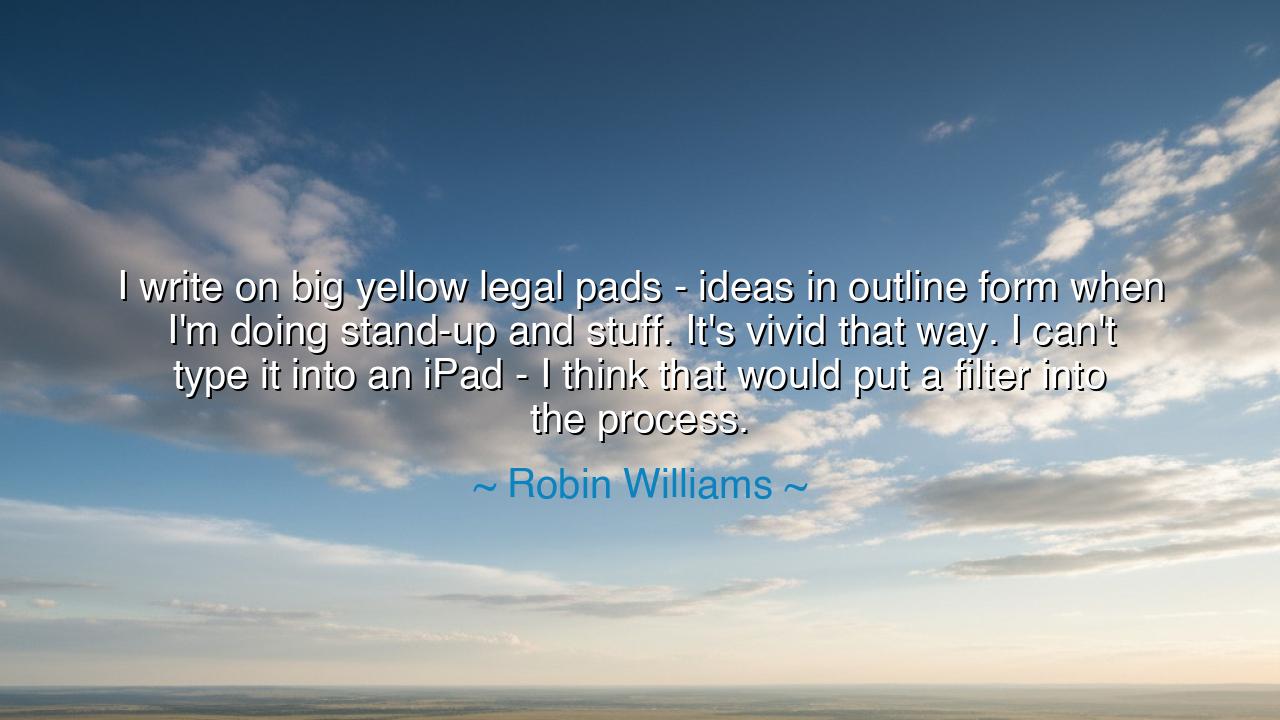
I write on big yellow legal pads - ideas in outline form when I'm
I write on big yellow legal pads - ideas in outline form when I'm doing stand-up and stuff. It's vivid that way. I can't type it into an iPad - I think that would put a filter into the process.






Hear the words of Robin Williams, the jester-sage whose laughter carried the weight of wisdom: “I write on big yellow legal pads—ideas in outline form when I’m doing stand-up and stuff. It’s vivid that way. I can’t type it into an iPad—I think that would put a filter into the process.” This is not merely a description of a method, but a revelation of how creation flows most purely when it touches earth and hand, when the spark of inspiration finds its way to paper unbroken by the cold glass of machines.
The meaning lies in the sacred act of writing by hand. To take up the pen, to let thoughts leap directly onto paper, is to allow the soul to speak without interruption. The legal pad, humble and yellow, becomes a stage upon which ideas dance freely, without the restraints of screens or codes. Williams saw in the act of handwriting a kind of vividness, a brightness, as though the ideas themselves glowed more fiercely when set upon paper, rather than trapped within the artificial window of a device.
This truth is not new. In the days of the ancients, poets like Homer and philosophers like Plato spoke their words aloud before they were ever written, letting thought move through voice and gesture before being carved into wax or pressed into papyrus. The medium was never neutral—it shaped the spirit of the work. Just as marble draws out strength from a sculptor’s chisel differently than clay, so too does pen and paper draw forth a different energy from the mind than digital keys. To Williams, the iPad was a barrier, a filter that muted the raw pulse of creativity.
Consider the example of Leonardo da Vinci, whose notebooks overflowed with sketches, questions, and inventions. His thoughts spilled directly from mind to hand, untamed and abundant, because he trusted the intimacy of ink upon parchment. Imagine if his genius had been confined within the limits of pre-structured forms or mechanical devices—it would have lost its wild beauty. In the same way, Robin Williams’ comedy, electric and alive, required a medium that matched his spirit: the legal pad, unassuming yet limitless, capable of catching lightning without dampening its fire.
The lesson, then, is this: choose the tools that set your creativity free, not those that bind it. In an age where devices tempt us with convenience, beware of the subtle chains they place upon thought. If the screen feels like a wall, return to the page. If the keyboard feels like a cage, pick up the pen. Let your ideas arrive in the form most natural to your spirit, for creativity dies when forced into unnatural molds.
Practically, begin by reclaiming the ancient rhythm of hand to page. Keep a notebook or pad beside you, and when inspiration strikes, let it flow without judgment, without filter. Do not wait for the perfect app or template—capture the spark in its rawness. Then, if need be, polish it later with the tools of technology. But let the first breath of the idea come forth unbroken, wild and free.
So remember Robin Williams’ teaching: the tool is never just a tool—it is part of the voice. Honor the tools that make your voice strongest, even if they seem simple or old-fashioned. For it is not the glitter of technology that makes ideas shine, but the purity of the channel through which they flow. Choose what is vivid, cast aside what is filtered, and let your creativity be as boundless and unrestrained as laughter itself.
In this way, you too may find that the humblest legal pad can hold the power of worlds, if only you let your truth pour onto it without fear.






AAdministratorAdministrator
Welcome, honored guests. Please leave a comment, we will respond soon